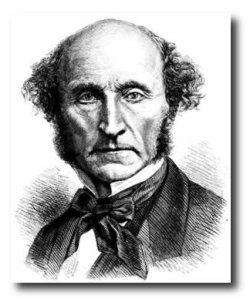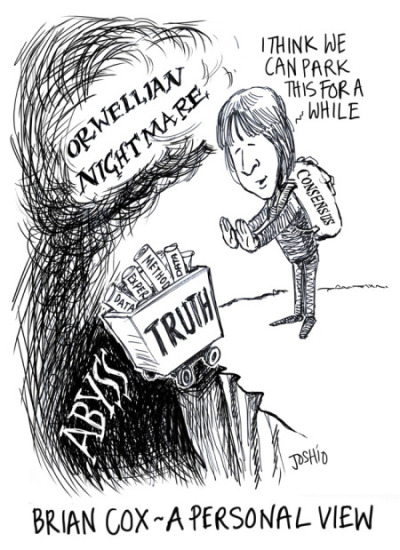As readers know, I have been keeping a close eye on the BBC's review of science coverage, to which TonyN and I have made a submission.
Science coverage on the television was also the subject of a recent lecture at the Royal Television Society (H/T Martyn in the comments) and it's hard to believe that the timing is coincidental.
 The speaker was Professor Brian Cox, who, for viewers outside the UK is something of a rising star in the world of TV science. His day job is in physics - he plies his trade at CERN - and if he has something of a retired pop star about him, this is because earlier in life he was the keyboard player in a chart-topping band.
The speaker was Professor Brian Cox, who, for viewers outside the UK is something of a rising star in the world of TV science. His day job is in physics - he plies his trade at CERN - and if he has something of a retired pop star about him, this is because earlier in life he was the keyboard player in a chart-topping band.
Cox is an engaging speaker and his lecture is well worth a look although I think it's fair to say that his thinking ends up in some pretty disturbing places.
 The thrust of the lecture is that television programmers should adopt a new approach to scientific controversies. Cox's view steers very close to what emerged from the notorious BBC seminar, where NGO activists got to influence BBC output on climate change. He first cites The Great Global Warming Swindle, describing its factual content as "total bollocks", but going on to say that it still deserved to be aired. The conclusion he reaches is that counter-consensus programmes have a valuable place, and he cites approvingly John Stuart Mill's famous words
The thrust of the lecture is that television programmers should adopt a new approach to scientific controversies. Cox's view steers very close to what emerged from the notorious BBC seminar, where NGO activists got to influence BBC output on climate change. He first cites The Great Global Warming Swindle, describing its factual content as "total bollocks", but going on to say that it still deserved to be aired. The conclusion he reaches is that counter-consensus programmes have a valuable place, and he cites approvingly John Stuart Mill's famous words
We can never be sure that the opinion we are endeavoring to stifle is a false opinion; and even if we were sure, stifling it would be an evil still.
But despite this, Cox is not happy with the status quo, and feels that something has to be done. His solution is that where a programme conflicts with the "scientific consensus", it should be treated as a "polemic" rather than a "documentary" and needs to be flagged as such, perhaps by calling it "a personal view" or otherwise labelling it in some way. This appears to me to be tantamount to forcing some programme makers to declare their ideas as "wrong", and this angle is not lost on Cox either, who wonders out loud if the position his thought process has taken him to is "authoritarian" - he mentions George Orwell too. Rather disturbingly he says he doesn't know the answer to this question and then, rather than resolve the dilemma, he drops the subject entirely.
Of course, even if we accept Cox's rather unscientific idea of a scientific consensus, there is still the question of who gets to decide what is consensus and what is polemic. The next programme he cites is Iain Stewart's Climate Wars, the three-part hit piece on climate sceptics that aired back in 2008. In Cox's view this is the epitome of what a well-balanced programme should be, with the presenter's view allegedly clearly distinguished from its presentation of the scientific consensus. Of course, as most readers here know, the problem with Climate Wars was that it was a highly political piece, with a well-known green activist as its scientific adviser, and of course famously misrepresenting the scientific consensus, as when presenter Iain Stewart climbed a bristlecone pine and extolled its virtues as a temperature proxy when there was a clear scientific consensus at the time that bristlecones were unsuitable for temperature reconstructions.
(As an aside, one of the members of the BBC Trust once told me that the BBC did allow sceptics to put forward their views, and cited Climate Wars as an example!)
Cox doesn't consider the issue of who defines what is consensus and what is polemic, and it seems clear to me that he hasn't thought the issues through properly. He can see that he is standing at the abyss, but doesn't want to turn away from it.
The liberal (in the old sense of the word) solution is, of course, a marketplace of ideas, in which people can put forward their cases as best they can. What Cox has to recognise is that his tiptoeing towards an Orwellian solution is only necessary because media ownership is so concentrated in the UK and because the BBC so dominates the marketplace. He doesn't need a truth commission to apply the "documentary" stamp to approved programmes. He needs the BBC to be broken up.
In the meantime though, there is the BBC's review of science, who will no doubt be aware of what Cox is saying. It will be interesting to see if the review adopts Cox's favoured approach, the one that makes him think of George Orwell.
